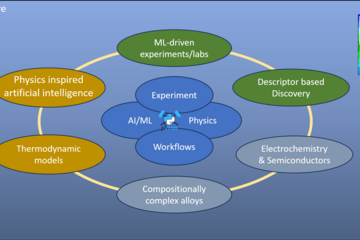All genres
11321.
Thesis - PhD
Damage and Strain Patterning Simulation of Structural Heterogeneity. Dissertation, RWTH Aachen University (2019)
11322.
Thesis - PhD
Characterization of aerosols and nanoparticles released during various indoor and outdoor human activities. Dissertation, RWTH Aachen University (2018)
11323.
Thesis - PhD
Modification of metal surface electronic properties by phenothiazine-based SAMs. Dissertation, Ruhr-Universität Bochum, Bochum, Germany (2018)
11324.
Thesis - PhD
On chemically sensitive atomic scale imaging. Dissertation, Ruhr-Universität Bochum, Bochum, Germany (2018)
11325.
Thesis - PhD
Charakterisierung von Wasserstofffallen und deren Einfluss auf die Wasserstoffversprödung in ferritischen Stählen. Dissertation, Ruhr University Bochum, Bochum, Germany (2018)
11326.
Thesis - PhD
Investigation of interfacial water structure at Ge(100)/electrolyte interfaces by attenuated total reflection infrared spectroscopy. Dissertation, Ruhr University Bochum, Bochum, Germany (2018)
11327.
Thesis - PhD
Phase nucleation through confined spinodal fluctuations at crystal defects in Fe–Mn alloys. Dissertation, RWTH, Aachen, Germany (2018)
11328.
Thesis - PhD
Microstructural influence on micro-damage initiation in ferritic-martensitic DP-steels. Dissertation, RWTH Aachen, Aachen, Germany (2018)
11329.
Thesis - PhD
Damage nucleation in DP-steels: experimental characterization of the contributing microstructural parameters. Dissertation, Fakultät für Georessourcen und Materialtechnik, RWTH Aachen (2018)
11330.
Thesis - PhD
A comprehensive in situ spectroscopic study of 2-mercaptobenzothiazole as a corrosion inhibitor for copper. Dissertation, Fakultät für Chemie und Biochemie der Ruhr-Universität Bochum, Bochum, Germany (2018)
11331.
Thesis - PhD
Nano-scale investigation of the degradation mechanism of multilayer protective coating for precision glass molding. Dissertation, RWTH Aachen, Aachen, Germany (2018)
11332.
Thesis - PhD
Synthese und Eigenschaften flexibler Resorcin-Formaldehyd- und Kohlenstoffaerogele. Dissertation, RWTH Aachen, Aachen, Germany (2018)
11333.
Thesis - PhD
A Contribution to Elucidate Interfacial Electric Double Layer Structures and Their Effects on Tribological Phenomena Using Force Microscopy. Dissertation, Fakultät für Maschinenbau der Ruhr-Universität Bochum, Bochum, Germany (2018)
11334.
Thesis - PhD
Synthesis and in-depth electron microscopic characterization of solvothermally grown copper indium sulfide thin films. Dissertation, RWTH Aachen, Aachen, Germany (2018)
11335.
Thesis - PhD
Deformation mechanisms and the role of interfaces in face-centered cubic Fe-Mn-C micro-pillars. Dissertation, RWTH Aachen, Aachen, Germany (2018)
11336.
Thesis - PhD
Preparation of Polyacrylic Thin Films on Iron by Controlled Radical Polymerization and their Delamination Behaviour. Dissertation, Ruhr-Universität Bochum, Bochum, Germany (2018)
11337.
Thesis - PhD
Solid state dewetting phenomena of aluminum thin films on single crystalline sapphire. Dissertation, RWTH Aachen University (2017)
11338.
Thesis - PhD
The Influence of Post-Growth Heat Treatments and Etching on the Nanostructure and Properties of Rutile TiO2 Nanowires. Dissertation, RWTH Aachen, Aachen, Germany (2017)
11339.
Thesis - PhD
Investigation of Sputtered Mo2BC Hard Coatings: Correlation of Nanostructure and Mechanical Properties. Dissertation, RWTH Aachen, Aachen, Germany (2017)
11340.
Thesis - PhD
Stability investigations of iridium-based catalysts towards acidic water splitting. Dissertation, Ruhr-Universität Bochum, Bochum, Germany (2017)


